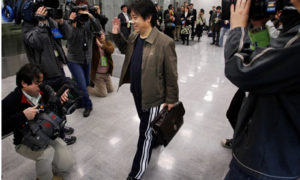Feng Zhenghu ends 90-day vigil at Tokyo International Airport
Agreement seen as the result of Feng’s tenacity and the galvanizing power of an uncensored Internet
Washington, DC, February 3, 2010. Initiatives for China has received confirmation from representatives in Japan that the Chinese government has agreed to allow human rights lawyer, Feng Zhenghu, to return to his home in Shanghai China. This announcement ends a more than 90-day vigil at Tokyo’s Narita International Airport.
The vigil began on November 3, 2009 when Mr Feng was refused entry into China for the eighth time since June of 2009. Chinese authorities at Shanghai Airport forcibly put Feng on a plane back to Japan’s Narita Airport where he voluntarily surrendered his Japanese visa and vowed to remain at the terminal in front of the customs area until the Chinese government recognized his right to return home. Feng is one of thousands of Chinese citizens who are victims of a policy, known as “blacklisting”, whereby politically incorrect Chinese are prevented from returning to China from abroad.
Feng was among several Chinese intellectuals who attended the Interethnic/Interfaith Leadership Conference sponsored by Initiatives For China on October 2009. At the conference, Mr. Feng spoke passionately about the illegal blaclisting practices of the Chinese government. Blacklisting is expressly forbidden under Article 13 of the United Nations Universal Declaration of Human Rights, to which China is a signatory.
Supporters as far away as Australia helped sustain Feng’s vigil through a series of “airlifts” organized by Initiatives for China that brought food and supplies to Feng. On December 24, Initiatives for China President, Dr. Yang Jianli, flew to Tokyo to meet with Feng and to seek the aid of the Japanese government in resolving the situation. On January 24, Japanese government officials met with Feng at the Airport and promised to investigate the situation. On February 2nd, Voice of America broadcasting announced that the Chinese government recognized Feng’s right to enter China and that his inability to do so was the work of “local officials” not authorized by the authorities in Beijing.
In responding to the announcement Dr. Yang said “We are grateful to the Chinese government and for the help of the Japanese government in resolving this situation. All Chinese citizens should be proud of this great patriot, Feng Zhenghu, for his brave stand for citizen rights”. Yang went on to say that the social networking via Twitter, Facebook, Skype, and Freegate anticensorship software were critical to building awareness and support from around the world that ultimately induced the Chinese government to act in a positive way. “We have seen how one individual and the power of Internet freedom can be a powerful check on repressive regimes” remrked Jim Geheran, Director, Initiatives for China.
Background Information:
1. A complete brief on the Mr. Feng Situation can be found the Initiatives for China website: www.initiativesforchina.org
2. LA Times article on Feng situation:
http://www.latimes.com/news/nation-and-world/la-fg-japan-terminal-man19-2009nov19,0,29937.story

